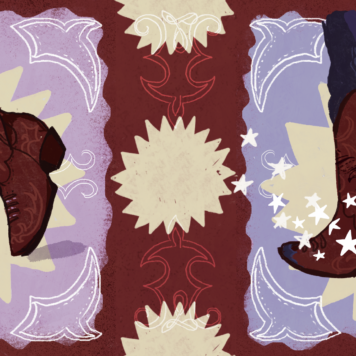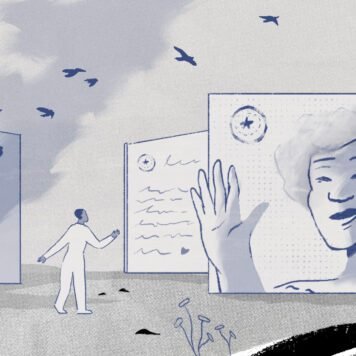This essay warrants a prequel:
Last July I invited my former college teammate to join me at a bar that my childhood friend manages in Brooklyn. She was visiting from California and we both slipped on a “carpe diem” type of attitude with regards to her short stay in NYC: “You’re, like, never in New York! Who cares if you’re tired!” I urged. I also reminded her that my bartender friend is very, very attractive, and we were soon in an Uber from the west side of Prospect Park.
Shaggy and 50 Cent played loudly enough in the cosy bar to maintain a vibe, but softly enough to introduce my two friends and then start up a conversation with a cutie who walked in shortly after. Said cutie, we’ll call him Marcus, and I flirted for a bit until a few more folks came to join him later, one of whom turned out to be his girlfriend.
To wrap up this story: Marcus and I hooked up that night in his plant-daddy apartment, which was directly across the street from the bar. A few weeks after this one-time hook-up I received a message from his girlfriend where it was clear that she was just as angry, if not more so, with me as she was with her partner of over a year.
“He was a weak boy, and you should have known better as a Black woman”, read her message to me about her 32 year old ex.
There is an insidious way that we infantilise men in order to rationalise their mistreatment of other people. By blaming other people’s actions, misfortunes, and emotions this affords us the foolish understanding that if we work hard enough to change our behaviours we can then avoid getting hurt again.
This article in Everyday Health helps illustrate the differences between how boys and girls are raised to conceptualise their surroundings. According to this research, socialisation of these two genders is noticeable on the playground, where boys focus on playing games which have clear winners or losers, while girls engage in more group support activities.
Differences in the way teenage boys and girls handle external stressors is also explained in this piece: “For example, if a teenage boyfriend and girlfriend have a fight, the girl is more likely to obsess over it, while the boy is more likely to distract himself with an activity,” details the author. Speaking from my own experience, the number of paragraph texts that I’ve sent to exes in years past greatly outnumbers how many I’ve received.
Some current examples of how society regularly infantilises men include the way Kyle Rittenhouse was described as a “little boy” after he shot and killed multiple people, the everpresent “boys will be boys” excuse for men’s bad behaviour, and some women’s extreme detailing of grocery lists so their partners will not fuck them up (again).
All three of these cases inaccurately emphasise that hardship is unfairly brought onto men for simply being men, despite them benefitting from sexism. Said benefits are less present when a man is further marginalised through classism, homophobia, transphobia, racism, or any other types of discrimination. We know this.
Double standards and the demonisation of women in the media
Additionally, just three years ago Khloe Kardashian (and her friends) publicly antagonised Jordyn Woods for having sex with Tristan Thompson (her partner at the time), yet he’s in numerous recent episodes of The Kardashians, depicted as a loving father who’s trying his best.
Following the weeks-long social media dragging from 2019, Khloe still does not publicly interact with Jordyn, and neither does Jordyn’s former best friend, Kylie Jenner (who is Khloe’s younger sister). Clearly there is room for forgiveness, but not for Jordyn and not years later.
Ultimately, modern society’s structuring of consequences delineates that demonisation of women (or any others) must happen in order for men to feel like they have won, or at the very least for them to feel like they have not lost.
The question of agency
At the Brooklyn bar Marcus had complete agency over our situation when he flirted with me in a dark corner of the bar on Fulton Street.
Marcus had complete agency over our situation when he invited me back to his apartment, which was conveniently a two minute walk away.
Marcus also had complete agency over our situation when he spent 35 minutes post-hook up telling me that he really didn’t want to continue dating his current partner, but he felt “a duty” to continue the relationship.
I reinforced the idea that he should do what makes him genuinely happy and respect people enough to be truthful. Then I left and got Popeyes; I was there for a good time, not a long time.
But just as Marcus had agency there, so did I:
I had complete agency over our situation when I walked up to him and introduced myself.
I had complete agency over our situation when I acknowledged that he was committed to a relationship with someone who is a stranger to me.
Subscribe to shado's weekly newsletter
Exclusive event news, job and creative opportunities, first access to tickets and – just in case you missed them – our picks of the week, from inside shado and out.

I had complete agency over our situation when I told him that I didn’t really care what his romantic situation was as long as I was in a physically safe circumstance where I was satisfied.
Agency vs Accountability
But the difference between Marcus and me is that I didn’t have a partner who I lied to. This joint agency that we had consequently meant that I personally held myself accountable for any negative consequences on my end specifically: any misfortune that I directly caused to my partner would be my responsibility to heal.
I held that partner, a grown adult with their own agency, to that same standard too. Marcus is not a bad person for cheating; he is a man who put his needs first and got found out.
As a sex worker I often get asked about how I feel around my married clients. People wonder if I feel bad, if I ask them about their marriage, or if I talk about their romantic relationships with them at all.
The answer to all three is absolutely the fuck not: I’m just doing my job.
If someone working at the front desk of a gym does not get penalised for swiping in folks who are overexercising, then why should I be condemned for having sex with men who are knowingly in relationships and are seeking me out for specific reasons?
Furthermore, this idea absolutely extends to relationships that are not server/patron related. No one has the time, energy, or interest to deeply question others’ actions before they make them; and people should abide by the idea that any actions are their responsibility regardless of if anyone stopped them or not.
There are no winners in misogyny
This article makes it abundantly clear that I don’t think we should censure others for men’s poor decisions and ‘bad’ behaviour, but I also want to vocalise that deciding to not have sex with a guy who has a partner does not solve any problems of misogyny or win/lose mentality. If I hadn’t been at the bar on Fulton Street it is likely that Marcus would have propositioned someone else to gain enjoyable sex. If not me, it would just be somebody else; and Tristan Thompson’s years-long cheating history illustrates this concept.
I don’t write this to absolve myself of guilt, partially because I don’t feel any but also because I hold this same idea for cheating men that I hold closely.
Like, I still really love and appreciate many of the women that my father cheated on my mother with; they were consenting adults who just wanted some fun! It’s no one’s fault that someone is in a relationship that they don’t want to be in but stay out of convenience, except for that person.
In conclusion, sometimes men just need to make their bed and lie in it without having someone else fluff up the pillows later. I’m tired of being expected to be another person’s maid when I have my own house to clean, and I don’t think I’m alone in that.
What can you do?
- Listen to the How To Hold Men Accountable Podcast
- Watch The Tragic Story of the Man-Child
- Read Revolting Prostitutes by Juno Mac and Molly Smith
- Read shado’s Body Dialogues series which explores topics relating to sexuality, reproductive justice, pleasure etc
- Read more articles by Addis HERE











